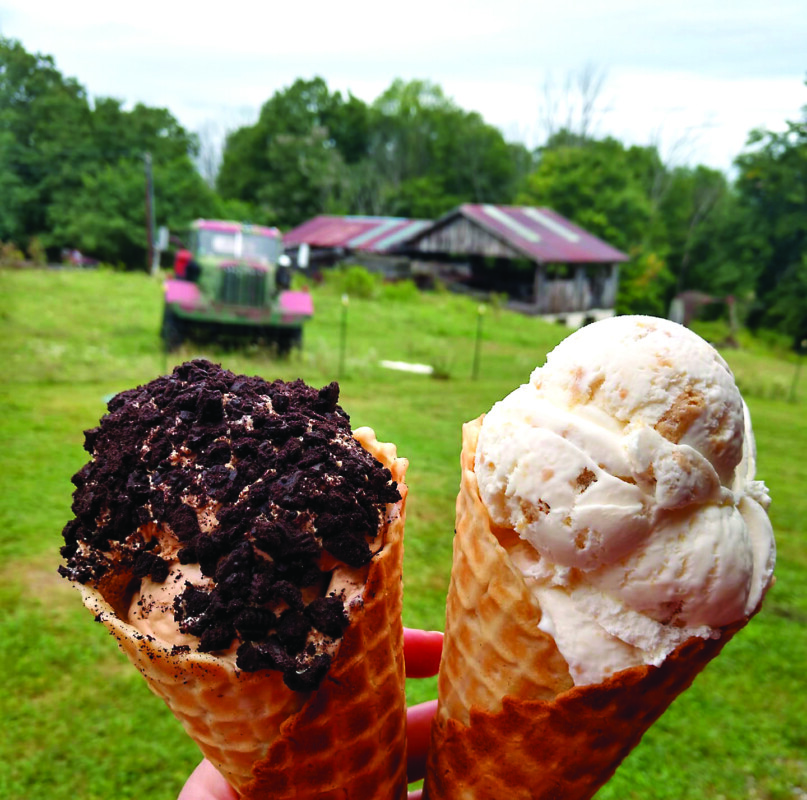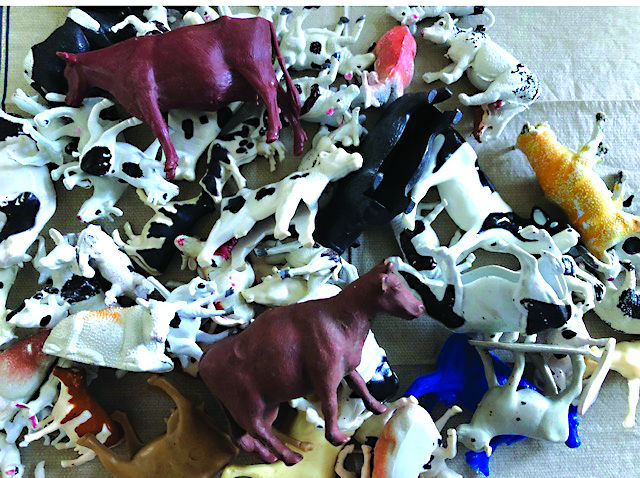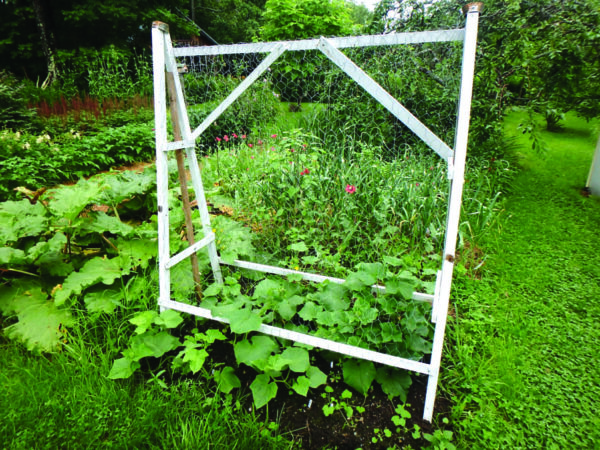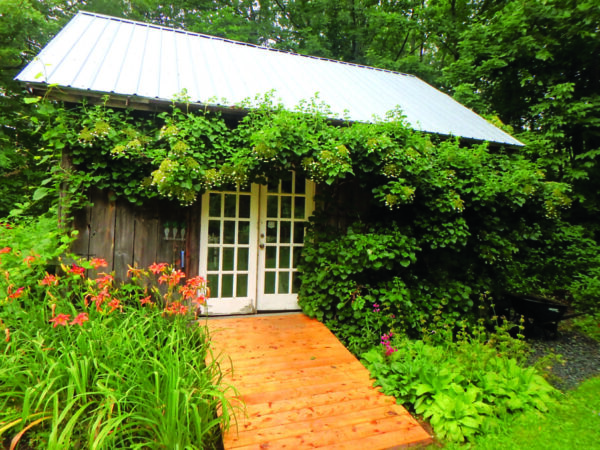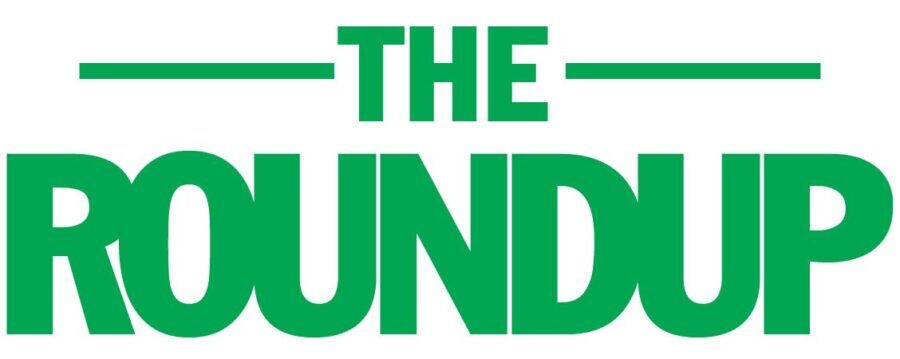Three or four days each week, a small group of family members and friends will gather at Connolly Brothers Dairy Farm in Temple to make ice cream. Each person has multiple roles, from hand-mixing ingredients to packing the ice cream in tubs — and, of course, everyone’s willing to do some taste testing. It’s proven to be a highly successful formula for the small family-run business.
“Ice cream sales never stop,” said Mike Connolly, the middle Connolly brother and the farm’s primary ice cream maker. “We keep pumping ice cream out … even right through the winter.”
Since purchasing their own equipment to make ice cream in the early 2000s, Connolly estimates the farm is now up to around 60 flavors made over the course of each year, about 15 of which are made almost every week. All of the farm’s ice cream is produced on site in small batches, from a pasteurized sweet cream base containing its own cows’ milk.
More than just a high-quality summertime treat, homemade ice cream has proven to be one of the many effective ways for local dairy farms to diversify and add value to their product in what has been an increasingly competitive and challenging market.
“The level of intelligence on any dairy farm, when it comes to business and how to survive and make a business thrive, would blow your mind,” said Amy Hall, executive director of Granite State Dairy Promotion. “I have never met a group of individuals who are so able to quickly adapt and find solutions to any problem that gets thrown their way.”
Connolly Brothers Dairy Farm sells its ice cream in pre-packaged containers in several sizes at the farm store and has plans in the works to open its own scoop shop on site. They also work with other local businesses to create specialty custom-made flavors, from maple-infused ice creams you can get at Parker’s Maple Barn in Mason, to cherry cordial, peanut brittle, peppermint candy cane or butter pecan-flavored ice creams available at Nelson’s Candy & Music in Wilton.
Contoocook Creamery, at Bohanan Farm in Contoocook, provides Granite State Candy Shoppe with an ice cream base produced from the milk of its cows. They also supply Frisky Cow Gelato in Keene with their milk and cream, and recently began selling their base to Whippoorwill Dairy Farm in Kensington for the purposes of making ice cream as well.
In Boscawen, Richardson’s Farm — not to be confused with Richardson’s Ice Cream in Middleton, Mass., which sells its ice cream wholesale to many New Hampshire ice cream shops — makes its own pasteurized base using milk and cream sourced from Hatchland Farm in North Haverhill, according to owner and ice cream maker Jim Richardson.
So how exactly does ice cream get made? We spoke with New Hampshire dairy farmers and ice cream makers to get some answers on how this sweet treat makes the voyage from cow to cone.
The scoop on ice cream-making
A batch of ice cream starts with a base made up of milk, cream, sugars and small amounts of stabilizers to maintain its consistency and prevent crystallization. Jamie Robertson, who runs Contoocook Creamery with his wife and three adult sons, said about 110 of the more than 200 cows on the farm are milked twice a day, 365 days a year.
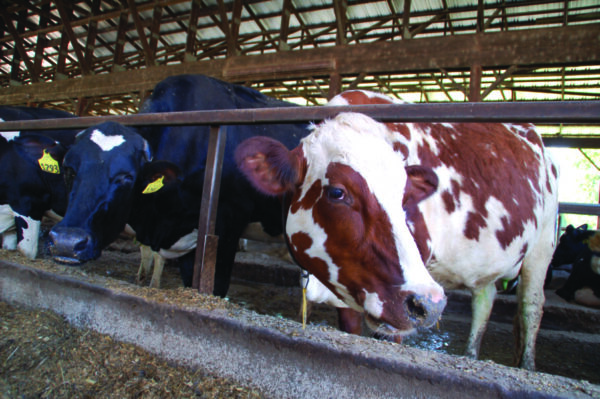
Three days a week, the milk is pumped from the barn to the processing plant, where it’s then pasteurized and homogenized. When making the ice cream base, Robertson said, the milk is mixed with each of the other ingredients before this step takes place.
“Pasteurizing is what we do to kill all the harmful bacteria in the milk, so we bring it up to a high temperature really fast, keep it there for a little under a minute and then drop it right back down,” he said. “It goes into the pasteurizer at 38 degrees, goes up to over 170 degrees and then comes back out at 38 degrees, and that all happens in under a minute. … Then we homogenize it, which breaks up the fat molecules so that they don’t separate out.”
Kristen May’s family has owned Hatchland Farm since 1971, beginning to make and sell their own ice cream about a decade ago. The farm produces vat pasteurized milk, or milk that is pasteurized at a slightly lower temperature for a longer period of time.
“We pasteurize at 145 degrees [for] 30 minutes,” May said. “The milk and the ingredients that we put into the ice cream are in big 300-gallon vats. … It takes a bit longer to do, but it actually makes [it] a little bit more different of a product. The flavor of the milk is a little more natural.”
Depending on his supply, Richardson said he receives regular shipments of Hatchland’s Farm raw milk and cream, which he uses to make his own ice cream base with.
“Legally, ice cream has to be at a minimum of 10 percent butterfat,” he said. “So we’re blending the milk and cream to get that butterfat level, and then obviously there are sugars involved, and a non-fat milk solid to boost the protein and add body to it.”
Some local ice cream makers will start with a pre-pasteurized base obtained from the HP Hood processing plant in Concord, to which several dairy farms in New Hampshire ship their milk through a number of cooperatives, according to Hall. This is also how Connolly Brothers Dairy Farm gets its milk pasteurized for ice cream making, Connolly said.
“Basically, we ship our milk up to Hood and then we get it back,” he said.
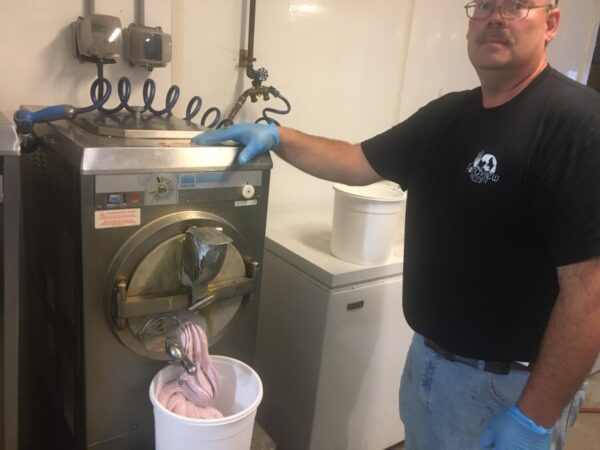
The base is poured into a batch freezer, and what ice cream makers do from there depends on the flavor they are creating.
“Sometimes it’s just a pure liquid extract or what’s called a variegate that goes into the machine,” Connolly said. “We hand-mix any of the chunky stuff, so chocolates, chocolate chips, cookies, all of that gets mixed in by hand, just because the machine will pulverize everything.”
Lisa Ilsley of Ilsley’s Ice Cream in Weare, which uses the Hood base mix, said her machine will churn out a batch of roughly five gallons of ice cream in 20 minutes, depending on the flavor.
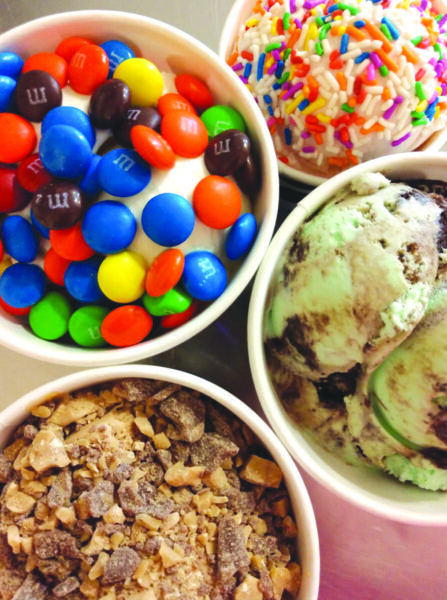
“The machine whips air into it,” she said. “That’s essentially what you’re doing when you’re making ice cream, is you’re changing it from a liquid to a whipped air solid.”
She’ll also hand-stir her ingredients as the ice cream is ready to come out of the machine. Once all of the swirls, fruits, chocolates or candy pieces are mixed in, the batch of ice cream is placed into a blast freezer designed to rapidly bring the temperature below zero.
After a hardening period, typically lasting at least 24 hours, the ice cream is moved to a holding freezer to bring the temperature back up, slightly softening it and making it scoopable at roughly 6 to 8 degrees.
Milking the opportunity
Dairy was once a dominating presence in New Hampshire’s overall agricultural landscape. There were more than 800 commercial dairy farms in the state as recently as the year 1970, according to Granite State Dairy Promotion. That number has continuously dwindled over the years, to 274 in 1990, 182 in 2000 and just 95 farms in 2020.
Slim profit margins for farmers, a worldwide surplus of milk, and the competition they face at the retail level from out of state, including through the emergence of plant-based beverages onto the market, have all been contributing factors to the industry’s gradual decline.
“Once a dairy farm goes out of business, the chances of them coming back are close to none,” Hall said. “It’s a really tough industry to survive in.”
The pandemic only exacerbated the struggles last year, as the sudden shutdowns of restaurants and public schools quickly resulted in an unprecedented oversupply of milk. Cooperatives limited the amount of product they were buying from farms, forcing dairy producers to dump any milk that could not be sold. May estimates that Hatchland Farm had to dump about 11,500 gallons of its milk off and on throughout last year. In the fall, they decided to sell 35 of their cows.
“Never in my father’s life had he worked that hard to produce a product that he had to see go down the drain, basically,” she said. “We’ve had surpluses at different times but we’ve always been able to find a place to get rid of it. We’ve never had to dump milk like that.”
Jared Johnson of Sanctuary Dairy Farm, a 10th-generation farm in Sunapee dating back to the 1700s, said that while milk prices have rebounded and restaurants are back open, input and overhead costs for farms have gone through the roof.
“It was a really dry year last year, so a lot of people had to buy a lot of feed because of the drought conditions,” he said. “Grain costs have increased probably 20 to 40 percent.”
Despite all of the ongoing challenges, dairy farms pivoted and still found unique opportunities.
Ilsley said her family’s dairy farm purchased a cream separator in October and began skimming their raw milk with it. The Ilsley Farm in Weare now sells quarts of its own heavy cream.
“We literally have a new dairy product that we sell now. I don’t think we would’ve done it if it wasn’t for Covid,” she said. “We have people come to the farm all the time to buy our raw milk, so we figured we would at least take the cream off and sell that. Our customers love it.”
Contoocook Creamery, which had been using glass bottles for its milk until the spring of 2020, quickly made the switch to plastic jugs after grocery stores stopped accepting glass bottle returns. This doubled their milk sales and increased the number of local stores you can now get their milk in. One hundred percent of their milk is also now bottled on site, Robertson said.
Supporting local dairy farmers is much easier than you may think, and does not have to involve travelling to a farm directly to purchase their product. Every bottle of milk in the dairy aisle of your local grocery store will have a code on it that specifies where it was processed. The code No. 33-08, Hall said, whether it’s on a Hood brand or a grocery store’s own brand of milk, indicates that it was processed at the HP Hood plant in Concord.
“One of the largest threats to the dairy industry is … milk that comes from outside of the region, which creates direct competition for our local farms,” she said. “If you pick up a gallon of Hood milk with the Code [No.] 33, you can feel good knowing that dairy farmers right here in New Hampshire sent their milk there, and that’s what’s in that bottle that you’re picking up off the shelves. … Not all of the milk in the dairy aisle has that.”
Ice cream for normalcy
After a season like no other last year, ice cream makers in New Hampshire are turning the page.
Christy LaRocca wrote down July 1 as a “back to normal” date for Moo’s Place Ice Cream. It marked the indoor reopenings of both the Derry and Salem shops for the first time in more than a year, and nearly all the company’s staff members were fully vaccinated by that point.
“We’re on pace to have a very, very good season,” said LaRocca, who owns Moo’s Place with her husband, Steven. “We’ve been so excited to open up and welcome everybody back indoors.”
Moo’s Place makes its own ice cream five or six days a week, producing more than 40 regular flavors as well as the occasional special, like chocolate-dipped cherry or wild blueberry crisp.
Ice cream sales have been very strong so far this summer at Granite State Candy Shoppe. Owner Jeff Bart said the Concord shop usually offers ice cream from Easter through the end of October, while in Manchester they scoop it year-round.
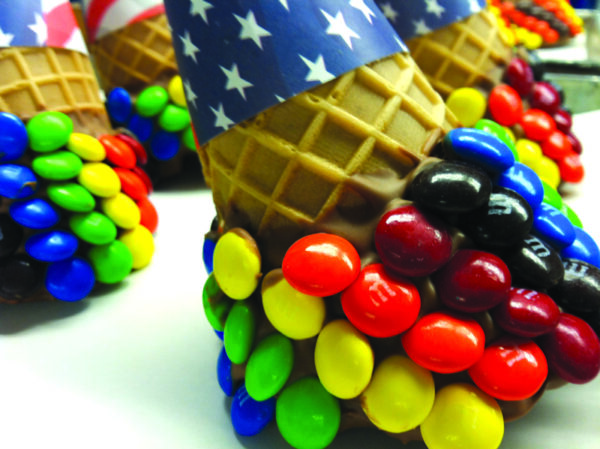
“Things are as good as they were back in the summer of 2019,” he said. “We have noticed that people are definitely interested in coming back downtown and stopping by.”
Around 30 flavors of ice cream are available at each shop at any particular time, including unique offerings like Flapjacks and Bacon, a cake batter ice cream with a swirl of maple syrup and bacon chunks, as well as a Mexican chocolate ice cream with a blend of cinnamon.
New for this year, Blake’s Creamery in Manchester has opened an ice cream window with outdoor patio seating directly in front of its restaurant on South Main Street. It’s now open every Wednesday through Sunday, from 3 to 8 p.m.
“It has been very well-received, and it’s really nice to see people just sitting outside under an umbrella and enjoying ice cream,” Blake’s Creamery co-owner Ann Mirageas said. “There were takeout windows when Blake’s opened in 1963, so it’s actually a return to its roots.”
Blake’s introduces a few new ice cream flavors to its lineup every year, some of which become permanent additions. This year, newcomers include salted caramel brownie, and Mocha Joe’s Dough, a Colombian coffee and chocolate ice cream with cookie dough and chocolate dough.
In Nashua, Hayward’s Ice Cream now has a brand new commissary space downtown where their ice cream is produced, with a kitchen three times the size. Owner Chris Ordway said ice cream is made six days a week and trucked to both Hayward’s stores in Nashua and Merrimack. A whopping 10 gallons is produced every 12 minutes from their machines.
“We’re bringing in something new every two weeks, and it may be something that you had a few years ago that we’re bringing back to get some new interest,” Ordway said of the flavors.
Memories Ice Cream in Kingston is also rotating out specialty ice cream flavors. Owner Dawn Padfield said they are up to at least 50 to 60 different offerings, including not just the hard ice cream but also a selection of soft-serve, frozen yogurt and vegan options.
If you can’t find your favorite ice cream flavor on the menu, it could be because that local stand or shop simply hasn’t been able to get certain ingredients to make it, a lingering issue from the pandemic that continues to affect the industry.
“Week to week, it’s different things,” Steven LaRocca said. “Some products are in stock one week, and then they’re not in stock for the next two or three weeks. It’s a constant battle.”
The New Hampshire Ice Cream Trail
An interactive way to enjoy locally made ice cream while supporting dairy farmers, the New Hampshire Ice Cream Trail is a passport program released by Granite State Dairy Promotion every year, usually around Memorial Day weekend. Maps can be downloaded by visiting nhdairypromo.org/ice-cream-trail, or can be found at any one of the trail’s participating locations. Maps are also at the Manchester Airport and at several state highway rest areas.
There are a total of 42 “stops” on this year’s trail scattered across the state, featuring dairy farms that make their own ice cream on site or ice cream makers that use local milk. Participants can visit each stop on the map and receive a passport sticker for a chance to win prizes.
“For me, one of the most exciting parts about the Ice Cream Trail is hearing from folks who have completed it and say that not only they had a blast but they learned some things too,” said Amy Hall, executive director of Granite State Dairy Promotion. “It was developed as a way to creatively get information about the value of dairy farms into the hands of consumers.”
Completed passports will be accepted through Oct. 18 and will be entered into a grand prize drawing. The grand prize winner receives a $200 Amazon gift card and a basket of New Hampshire-made goodies, but all who complete the trail still receive a complimentary sweatshirt.
Where to get New Hampshire-made ice cream
This list includes New Hampshire restaurants, dairy farms and ice cream shops and stands that offer ice cream either made on site or, where specified, sourced locally. Some dairy farms also make proprietary flavors for New Hampshire businesses using their own products — those are included here as well. Do you know of another local business serving homemade ice cream that isn’t on this list? Let us know at food@hippopress.com.
• Arnie’s Place (164 Loudon Road, Concord, 228-3225, arniesplace.com) offers more than 25 homemade ice cream flavors, in addition to ice cream cakes, novelties and more.
• Beech Hill Farm and Ice Cream Barn (107 Beech Hill Road, Hopkinton, 223-0828, beechhillfarm.com) carries several flavors of ice cream from Blake’s Creamery.
• Blake’s Creamery (353 S. Main St., Manchester, 669-0220, blakesicecream.com) offers dozens of unique premium ice cream flavors, and, new for the 2021 season, now has an ice cream takeout window that is open Wednesday through Sunday from 3 to 8 p.m. Blake’s also has several seasonal wholesale accounts at restaurants and ice cream stands throughout New Hampshire, Maine and Massachusetts.
• Bruster’s Ice Cream (621 Amherst St., Nashua, 881-9595, find them on Facebook @brustersnh) has more than two dozen signature and classic flavors of homemade ice cream that are made on site.
• Charlie’s Ice Cream (150 Front St., Exeter, 772-7400, find them on Facebook @charliesicecreamnh) offers more than 50 flavors of ice cream made on site in small batches, including a selection of “21+” flavors infused with premium alcohol.
• Chuckster’s Family Fun Park (9 Bailey Road, Chichester, 798-3555; 53 Hackett Hill Road, Hooksett, 210-1415; chucksters.com) carries more than two dozen ice cream flavors from Blake’s Creamery.
• The Common Man (25 Water St., Concord, 228-3463; 304 Daniel Webster Hwy., Merrimack, 429-3463; 88 Range Road, Windham, 898-0088; 10 Pollard Road, Lincoln, 745-3463; 21 Water St., Claremont, 542-6171; 60 Main St., Ashland, 968-7030; Town Docks Restaurant, 289 Daniel Webster Hwy., Meredith, 279-3445; Airport Diner, 2280 Brown Ave., Manchester, 623-5040; Tilt’n Diner, 61 Laconia Road, Tilton, 286-2204; 104 Diner, 752 Route 104, New Hampton, 744-0120; thecman.com) offers its own homemade ice cream across each location’s dessert menus.
• The Common Man Roadside Market & Deli (1805 S. Willow St., Manchester, 210-2801; 530 W. River Road, Hooksett; 25 Springer Road, Hooksett, 210-5305; 484 Tenney Mountain Highway, Plymouth, 210-5815; thecmanroadside.com) offers Common Man-made ice cream across each location’s dessert menus.
• Connolly Brothers Dairy Farm (140 Webster Hwy., Temple, 924-5002, find them on Facebook) offers dozens of flavors of homemade ice cream using a base that comes from the farm’s own cows’ milk. Dozens of flavors are available at the farm store in pre-packaged containers coming in several sizes. Connolly Brothers Dairy Farm also makes proprietary ice cream flavors for other New Hampshire businesses, like Nelson’s Candy & Music in Wilton and Parker’s Maple Barn in Mason.
• Countrybrook Farms (175 Lowell Road, Hudson, 886-5200, countrybrookfarms.com) has dozens of flavors of ice cream from Blake’s Creamery.
• Cremeland Drive-In (250 Valley St., Manchester, 669-4430, find them on Facebook) offers multiple flavors of homemade hard ice cream, as well as soft-serve, frozen yogurt and sherbet.
• Dancing Lion Chocolate (917 Elm St., Manchester, 625-4043, dancinglion.us) offers unique flavors of house-made small-batch ice cream during the summer, sold in cups and house-made cones as well as sundaes and frappes.
• Devriendt Farm Stand and Ice Cream Shoppe (178 S. Mast St., Goffstown, 497-2793, devriendtfarm.com) offers dozens of flavors of ice cream from Blake’s Creamery.
• Dr. Davis Ice Cream (75 Route 13, Brookline, 673-6003, drdavisicecream.com) has been in business for more than eight decades, serving up more than two dozen homemade ice cream flavors.
• Dudley’s Ice Cream (846 Route 106 N, Loudon, 783-4800, find them on Facebook) offers more than 20 flavors of homemade hard ice cream, in addition to soft-serve and ice cream cakes.
• Goldenrod Restaurant Drive-In (1681 Candia Road, Manchester, 623-9469, goldenrodrestaurant.com) has more than 30 flavors of homemade ice cream.
• Gould Hill Farm (656 Gould Hill Road, Contoocook, 746-3811, gouldhillfarm.com) serves ice cream sourced from Granite State Candy Shoppe in Concord and Manchester.
• Granite State Candy Shoppe (13 Warren St., Concord, 225-2591; 832 Elm St., Manchester, 218-3885; granitestatecandyshoppe.com) has around 30 homemade ice cream flavors available at both locations, with specialty and customizable make-your-own sundae options. All of its flavors are made from an ice cream base sourced from Contoocook Creamery, at Bohanan Farm in Hopkinton.
• Hatchland Farm’s “Wicked Good” Dairy Delites (3095 Dartmouth College Hwy., North Haverhill, 348-1884, find them on Facebook) is a family-owned and -operated dairy farm that offers its own milk and ice cream products, including dozens of flavors of hard ice cream and soft-serve. The farm also sells its milk and cream to Richardson’s Farm in Boscawen to make ice cream with.
• Hayward’s Homemade Ice Cream (7 Daniel Webster Hwy., Nashua, 888-4663; Merrimack 360 Shopping Plaza, Daniel Webster Hwy., Merrimack; haywardsicecream.com) has been in business for more than seven decades, featuring dozens of homemade ice cream flavors on its menu out of both locations.
• Hayward’s Ice Cream of Milford (383 Elm St., Milford, 672-8383, haywardsfamilyicecream.com) is a third-generation ice cream stand that offers more than 50 homemade ice cream flavors, in addition to frozen yogurts and sherbets.
• Ilsley’s Ice Cream (33 S. Sugar Hill Road, Weare, 529-6455, find them on Facebook) offers about 10 flavors of its homemade ice cream during its season, in addition to specialty flavors of the week that are regularly rotated out.
• Jake’s Old-Fashioned Ice Cream and Bakery (57 Palm St., Nashua, 594-2424, jakesoldfashionedicecream.com) offers homemade wholesale packaged ice cream in a variety of flavors.
• Jordan’s Ice Creamery (894 Laconia Road, Belmont, 267-1900, find them on Facebook @jordansic) has been in business for more than 25 years, serving up dozens of flavors of homemade ice cream in addition to a large selection of cakes and pies.
• Just the Wright Place for Ice Cream (95 Portsmouth Ave., Stratham, 775-0223, find them on Facebook @wrightplaceforicecream) offers a wide selection of homemade ice cream flavors, and also takes orders for ice cream cakes.
• Kellerhaus (259 Endicott St. N, Weirs Beach, 366-4466, kellerhaus.com) always has a rotating selection of more than a dozen homemade ice cream flavors.
• Memories Ice Cream (95 Exeter Road, Kingston, 642-3737, memoriesicecream.com) has been serving dozens of homemade ice cream flavors out of a converted dairy barn since 1992, also offering ice cream cakes and wholesaling to some local restaurants and country stores.
• Moo’s Place Homemade Ice Cream (27 Crystal Ave., Derry, 425-0100; 15 Ermer Road, Salem, 898-0199; moosplace.com) makes all of its own hard ice creams available in several dozen unique flavors, in addition to frozen yogurts, Italian ices and ice cream cakes.
• Nelson’s Candy & Music (65 Main St., Wilton, 654-5030, nelsonscandymusic.com) offers more than a dozen flavors of ice cream produced at Connolly Brothers Dairy Farm in Temple, using the shop’s own chocolates, candies and other ingredients.
• Parker’s Maple Barn (1349 Brookline Road, Mason, 878-2308, parkersmaplebarn.com) offers several flavors of ice cream produced at Connolly Brothers Dairy Farm in Temple.
• The Puritan Backroom Restaurant (245 Hooksett Road, Manchester, 669-6890, puritanbackroom.com) has more than two dozen traditional and unique homemade ice cream flavors.
• Richardson’s Farm (170 Water St., Boscawen, 796-2788, richardsonsfarmnh.com) has dozens of flavors of ice cream made on site, using its own pasteurized ice cream base sourced with milk and cream from Hatchland Farm in North Haverhill.
• Sanctuary Dairy Farm Ice Cream (209 Route 103 Sunapee, 863-8940, icecreamkidbeck.com) has dozens of flavors of homemade ice cream available, including many dairy-free, sugar-free, gelato and low-fat options. The farm also has wholesale accounts for businesses that carry its ice cream in quarts, including Achille Agway in Hillsborough.
• Stuart & John’s Sugarhouse (31 Route 63, Westmoreland, 399-4486, stuartandjohns.com) offers several flavors of ice cream from Blake’s Creamery.
• Sugar & Ice Creamery (146 Calef Hwy., Barrington, 888-616-8452, sugaricecreamery.com) has multiple flavors of homemade ice cream, with sundae options and freshly baked waffle cones also available.
• Trombly Gardens (150 N. River Road, Milford, 673-0647, tromblygardens.net) has more than a dozen flavors of its homemade ice cream, available for sale at the farm store in quarts.
Featured photo: Isley’s Ice Cream in Weare.

